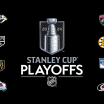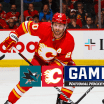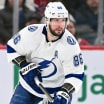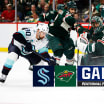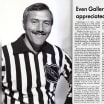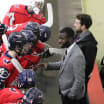NHL.com's Q&A feature called "Five Questions With ..." runs every Tuesday. We talk to key figures in the game and ask them questions to gain insight into their lives, careers and the latest news.
The latest edition features Nevin Markwart, who was selected by the Boston Bruins in the first round (No. 21) of the 1983 NHL Draft. Markwart played all but 10 games over his eight NHL seasons with the Bruins. He retired from the Calgary Flames following the 1991-92 season because of a chronic shoulder injury after scoring 109 points (41 goals, 68 assists) in 309 NHL games.
After retiring from hockey, Markwart has spent the past 25 years in the business world, working for more than two decades in wealth management before switching his focus earlier this year to cybersecurity with FutureVault, a document storage and utilization company.
Five Questions with Nevin Markwart
Former NHL forward discusses time with Bruins, jobs in finance, cybersecurity after hockey
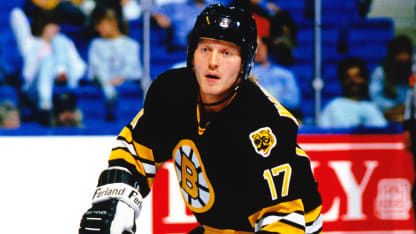
Nevin Markwart has taken a road less traveled, but no less interesting, since he retired from the NHL after eight seasons, most with the Boston Bruins, following the 1991-92 season.
After earning a Master of Business Administration from Northeastern University, Markwart had forged a second career in finance. Now he is working in the computer field after earning a Master of Science in cybersecurity from Brown University in 2019.
"I was always strong academically," the 55-year-old said. "I was actually offered entrance into Princeton [University] when I was 16, but where I grew up in Western Canada, to be quite frank, we didn't know what that was and so we turned it down; it was just too far away. My first year on the Bruins, I actually took a computer science course at Boston College. It was an evening course, but it was very difficult to make the classes because we are on the road quite a bit as an NHL team.
"That experience resulted in me concluding that I needed to save up enough money being an NHL hockey player so that I could pay for myself to go to school when I was done, and that is essentially what I did."
Markwart said his jobs after hockey are rooted in the things he learned on the ice: teamwork, camaraderie, having the backs of those he played with and hard work. With the Bruins, Markwart saw himself as a protector of more skilled teammates on some pretty talented teams; he led Boston in penalty minutes during the 1985-86 and 1986-87 seasons.

In his wealth management career, he protected the investments of individuals and corporations with the same tenacity, he said. Now, with FutureVault, he is being entrusted to protect data.
"I am a fiduciary for people's information," Markwart said. "As a cybersecurity expert, my job is to ensure that individuals and organizations like corporations and governments, that their information is secure so they can use their information to prosper. We've transitioned to an information age like nothing we have ever seen before with the development of things like smartphones and broadband communication. The industry has absolutely exploded and is changing society, is changing every facet of society. It's a very exciting area, and I'm excited for this next 10-15 years and helping people to manage the security of their information."
Here are Five Questions with … Nevin Markwart:
When you look back at the entirety of your professional careers, what stands out most for you?
I think the unknown nature of what's around the corner. I wasn't a hockey phenom. I was very average. I started to stand out a little bit when I was 16 and a lot when I was 18. My first year of junior, I didn't even make the Tier 1 team in Regina (of the Western Hockey League). I spent half that season with the Tier 2 team and got called up halfway through the year, and then the next year I was [ranked] eighth overall in the [NHL] Draft. So who could have seen that around the corner? I hurt my shoulder on Jan. 7 of my draft year and never played another [junior] game. The Bruins came in first the year before and had the last pick in the first round, and three months later I was in the starting lineup against the Montreal Canadiens. Again, I think I have been very fortunate that my preparation throughout my life has enabled me to take advantage of opportunities that have come around the corner unexpectedly.
Do you have a favorite Bruins memory from the nine years you spent there?
There are so many of them, they are kind of hard to separate away. I would say that the game that we finally beat Montreal in the playoffs (in the second round of the 1988 Stanley Cup Playoffs); we had not done it for so many series (four in a row). Those are the kind of memories that stick in my mind with a smile. The losses to [the] Edmonton [Oilers] in the [Stanley Cup] Final in 1988 and '90, they were great accomplishments, but we didn't quite get there, so those ones you still smile but you wish you had won a Stanley Cup. I think that is what every NHLer is always looking to attain. Then I go all the way back to the day after I got drafted. I flew all the way to Boston with (general manager) Harry Sinden, and he took me on a tour through Boston Garden and looking up at the banners, both the Bruins and the Celtics. I've always said, it was a great way to grow up. I was 18 years old, I was away from home, and the next nine years were my undergraduate education in life. I have two master's degrees today, but I don't have an undergraduate degree. My undergraduate degree was in hockey.
That 1983-84 Bruins team that you joined was filled with so many huge names like Ray Bourque, Terry O'Reilly, Mike Milbury and others that went on to have great careers in the game and after they quit playing. Did you have a sense when you walked into that room how special a room that was?
So an 18-year-old with a stall in an NHL dressing room just has your eyes wide, wide open all the time. I was fortunate that I played junior hockey for the Regina Pats, and it is the longest continuously running hockey franchise in Canada, so it takes you back to World War I and therefore it has, and had, a long legacy of tradition, which was very comfortable to me when I got to Boston because Boston had the exact same thing. My captain was Terry O'Reilly, and years and years later my parents told me a story about how about a month into the season, Terry called my parents in Saskatchewan and told my parents that they did not need to worry about me, that the team was going to take care of me. Being in that locker room was a familiar place, it was a place all about team. People backed each other up, people relied on each other. I took those lessons into business, and they have been very, very helpful as I have developed companies and developed individuals on their career journeys.
Tell me a bit about your latest career challenge with FutureVault?
What FutureVault is endeavoring to do from a vision perspective is to create a document ecosystem, which today doesn't really exist. In a document ecosystem, I know where my document is, I know that it is secure, and I know that is accessible; and I can also do things like giving permission to other trusted advisers to have access to it for limited periods of time or a longer period of time; and whenever someone accesses a document, there is an auditable trail that said so-and-so read it, so-and-so printed it, so-and-so downloaded it. It has a trail that tells you whenever a document gets touched. What that gives an individual or an organization is that sense of comfort that your documents are all in one place, that they are super, super secure, no one is going to be able to fuss with them, and if they do there will be a trail and you will be able to understand who and when someone accessed your documents.
As you look at kids coming into the League now, what do you say to that 18-year-old kid that is going to be the next one in that professional dressing room?
I believe success comes from a combination of preparation and opportunity, and an 18-year-old that has been drafted in the first round has been given both. They have prepared to be in the spot that they are in and they are getting a tremendous opportunity. In the early part of your career, there has to be tremendous focus on the specific attributes that you, as a player, possess that make you what I call a domain-area expert; you're one of the best skaters in the League, one of the best shooters, one of the best defenders, one of the best face-off people in the League. I've always believed that you have to identify in your inventory of skill set two or three areas where you are better than anyone else in the world and you really need to focus on those areas and make sure you stay at that level. As you transition through your career, I believe that players need to think very seriously about life after hockey. Whether you are a three-year player or a seven-year player or 11-year player, you will live for decades after you are done your career, and the preparation for that next phase of your life doesn't start when you retire from professional hockey. Just in the way that I said success comes from preparation and opportunity, there will be a lot of opportunities on the other side of your career. Remember, some guys only get one year, some guys only get 20 games. I would say to players: Focus on the areas that you are the greatest hockey expert at and maintain that strong skill set, and you should be thinking about how to prepare for the next phase of your life. And I don't think those two things interfere with each other, which may be the common view today. I would rail against that. I don't believe that to be the case.



